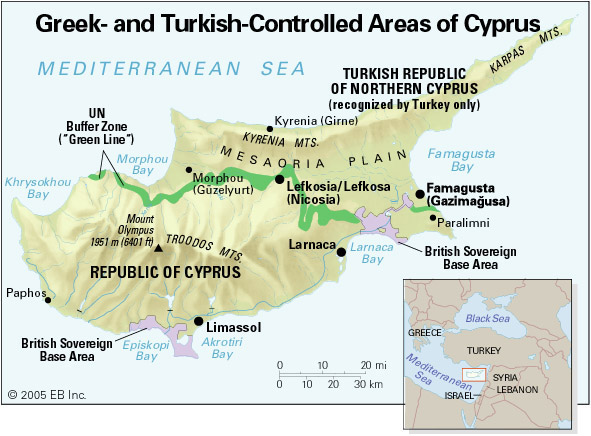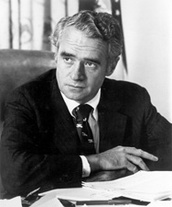|
By Jody Brumage In the 1970s, a coup d’état and subsequent military invasion of the eastern Mediterranean island nation of Cyprus entangled U.S. foreign policy and left Congress and two presidential administrations in the position of determining how the government would respond to the complex situation. In this two part blog post, we will investigate how the Senate responded to the initial invasion of Cyprus in 1974 and then how those actions were reconsidered later in the decade under Senate Majority Leader Robert C. Byrd’s leadership. The Republic of Cyprus was established to govern the island, inhabited by ethnic Greek and Turkish communities in 1960, placing the nations of Greece and Turkey in opposition over control of the new government. For over a decade, Greece sought to unite Cyprus under its policy of “enosis” (union of Greek communities living outside of Greece with the Greek state). These tensions boiled over into the July 15, 1974 coup d’état which overthrew President Makarios III and established a pro-union government. In response, Turkey invaded Cyprus on July 20, 1974 and in the coming weeks established the Turkish Republic of Cyprus, claiming the northern section of the island as its own territory. As the United States stepped into the role of mediator between the two nations and their struggle for control over Cyprus, the Senate placed its support with the Greeks and accused Turkey of violating conditions of the 1961 Foreign Assistance Act. Signed into law by President John F. Kennedy on September 4, 1961, this act reorganized the nation’s foreign aid programs. A provision of the act barred military aid, such as arms sales, from being used in offensive acts which violated international law. This clause provided the Senate with evidence to support sanctions against Turkey for its involvement in the Cyprus conflict since the country had used arms provided from the U.S. in its invasion of the island.
Amid the battle over the embargo between Congress and the White House, Senator Byrd’s office received an influx of letters from constituents offering their support or opposition to the proposed sanction against Turkey. Notable among these letters were several from Greek Orthodox Churches, including those in Weirton and Charleston, West Virginia, urging Senator Byrd to support the Greek Cypriots in the conflict. As the efforts to impose the embargo continued in Congress, Senator Byrd prepared a form letter to respond to the growing numbers of incoming letters, explaining the various actions the Senate was considering in response to the situation in Cyprus.
The persistence of Congress led to a final effort in December 1974 to impose the embargo. The Senate approved an amendment calling for an end of arms sales and military aid to Turkey unless the president could reach a diplomatic solution by December 10, 1974. When President Ford failed to break the impasse by the specified date, the embargo went into effect on February 5, 1975. In the short term, the embargo did little to ease the tension in Cyprus and instead threatened the already fragile alliance between Turkey and the United States. Within four years, Congress would again be debating the controversial embargo. Comments are closed.
|
Welcome to the Byrd Center Blog! We share content here including research from our archival collections, articles from our director, and information on upcoming events.
Categories
All
Archives
July 2023
|
Our Mission: |
The Byrd Center advances representative democracy by promoting a better understanding of the United States Congress and the Constitution through programs and research that engage citizens.
|
Copyright © Robert C. Byrd Center for Congressional History and Education
|



 RSS Feed
RSS Feed
